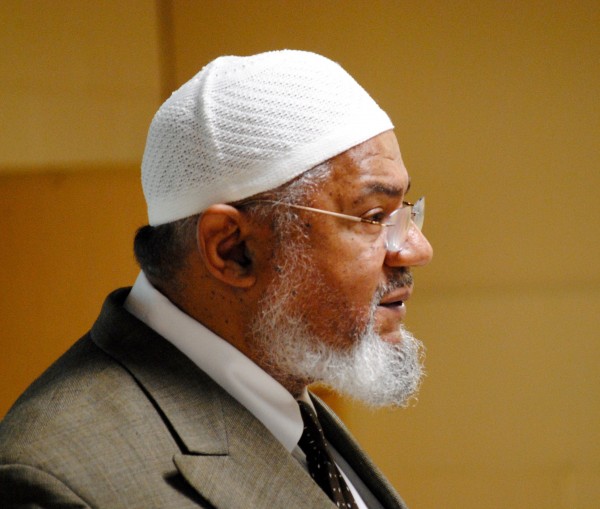
“I wish to welcome you and also seek your assistance in trying to join together and be able to dispel a lot of these unfortunate characterizations of the Muslim community,” said Imam Farid Ansari, to the crowd gathered inside the Islamic Center of Rhode Island in Providence. Ansair was speaking for the Rhode Island Council for Muslim Advancement, (RICMA).
The rise of Islamophobia and anti-Muslim violence across the country in response to recent terror attacks and political demagoguery has lead Muslim leaders in our state to make strong statements unequivocally condemning the terror attacks in Paris and the recent mass shooting in San Bernardino. Ansari said, “these acts are not representative of the Islamic faith…
“The backlash of these atrocious attacks have been felt deeply in the Muslim community nationwide. Inflammatory rhetoric as demonstrated by some politicians to isolate and marginalize American Muslims is reckless and undermines the safety and security of our great nation,” Ansari continued.
On a positive note, he said, “the American Muslim community in Rhode Island has unprecedented support from public officials, law enforcement, faith community and fellow citizens and we deeply appreciate this support.”
To counter this wave of mistrust, hatred and violence and because “we strongly believe that hate can only be countered by love and peace,” Ansari announced that, “we will be expanding our engagement with the Rhode Island community, to launch several social and educational programs across the state.”
These programs include an open house this Saturday from 1-3 at the Islamic Center, and continuing open houses at mosques throughout the state.
Other speakers took to the podium to denounce Islamophobia and to stand in solidarity with the Muslim community. Lutheran Bishop James Hazelwood lamented the way politicians have used the tragic recent events as an opportunity to divide rather to unite.
Jim Vincent of the NAACP says that his organization is “totally against the xenophobia that is happening in our country today.” Blaming all Muslims for the attacks in Paris or San Bernardino makes as much sense as blaming all Christians for the actions of the KKK, just because they use the cross as their symbol.
Episcopal Bishop Nicholas Knisely, said, “It’s important for us… to reject the voices calling for us to treat the people of one faith differently than all others.”
“Words have power,” said Rabbi Sarah Mack of the Greater Providence Board of Rabbis, “Our language can create good will and harmony in the community, or as we have sadly seen in recent weeks, our words can build mistrust, hatred and xenophobia.”
Dr. Wendy Ibraham of the Sisters Wing of RICMA, said that speaking for women Muslims is difficult, because they are such a diverse group. “Eighteen years ago, I decided to adopt a faith that believed in love and freedom and mercy and justice and kindness for all people, regardless of faith or ethnicity or color or creed… It’s important right now for Muslims to come forward and tell you what our religion is about.”
Toby Ayers, on behalf of the Rhode Island for Community and Justice and runs a youth program called Project Respect. In this program, “Young people become leaders in service to the mission of fighting bias, bigotry, and racism by promoting understanding between all races, religions and cultures through advocacy, conflict resolution and education.
Reverend Thomas Wiles, of the American Baptists channeled Roger Williams, the founder of Rhode Island, who championed religious liberty and freedom of conscience.
“We continue to proclaim,” says Wiles, “that for faith to be true it must be free.”
Evangelical Pastor Andrew Mook advocated for a radical Christianity that embraces love and peace, even at the cost of one’s own life.
Last up was Reverend Donald Anderson, who decided to name the “elephant in the room,” Donald Trump. (That the elephant is the symbol of the Republican Party might be a subtle joke on Anderson’s part.)
“We are called, as faith leaders, to speak truth to power. So let’s do that. Mr Trump, we will not stand for your demagoguery that leads to discrimination. For those people who would follow him and his foolishness, those who would value temperament more than truth, audacity more than accuracy, let us say that love will win.”
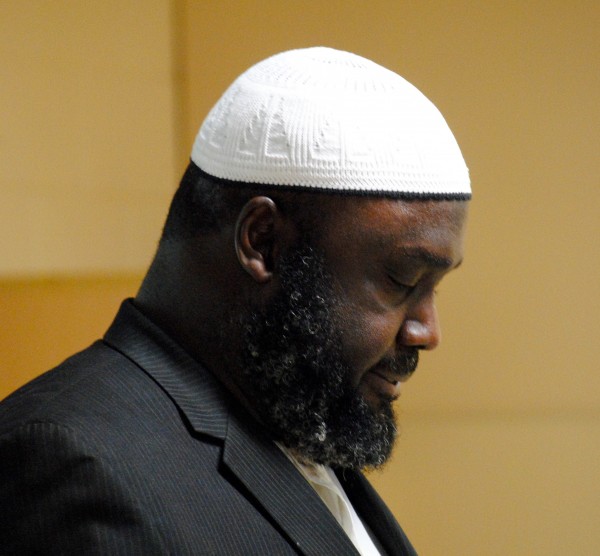
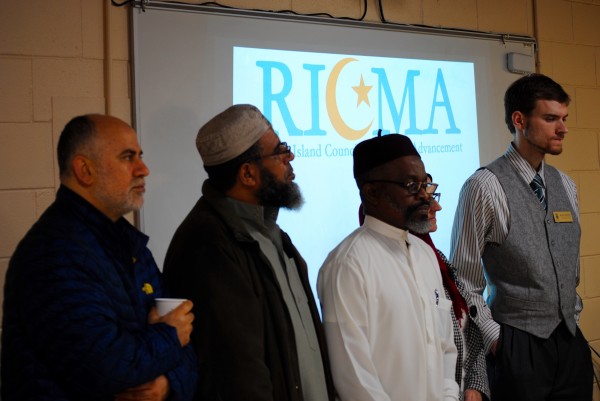
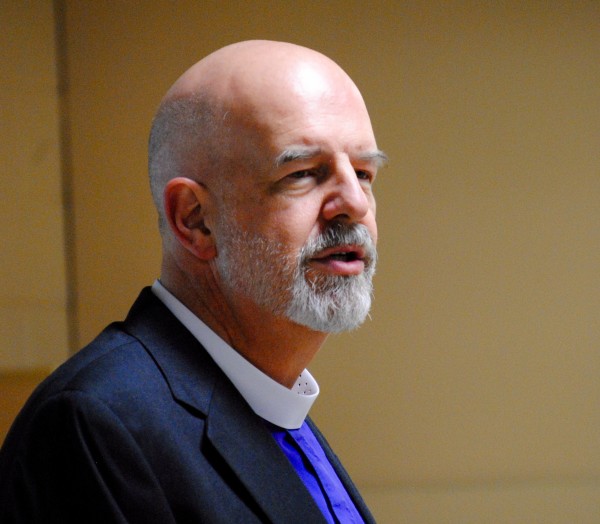
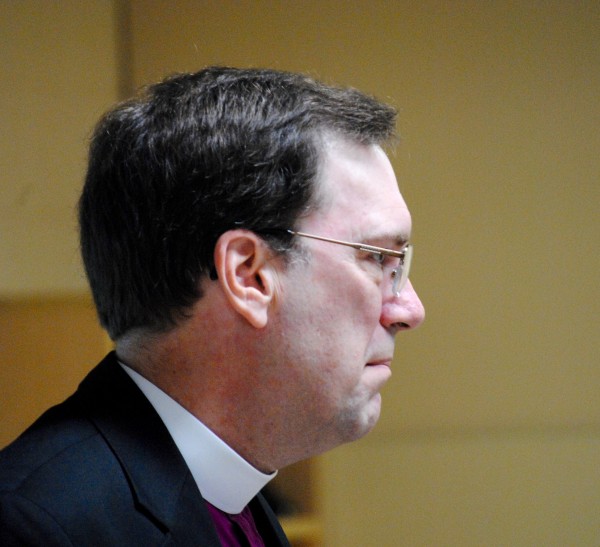

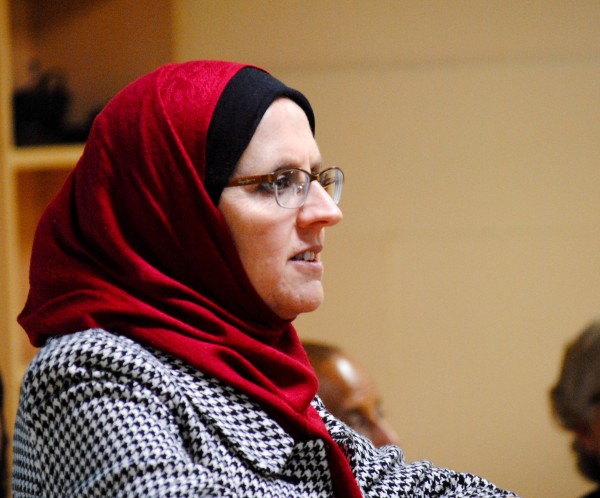


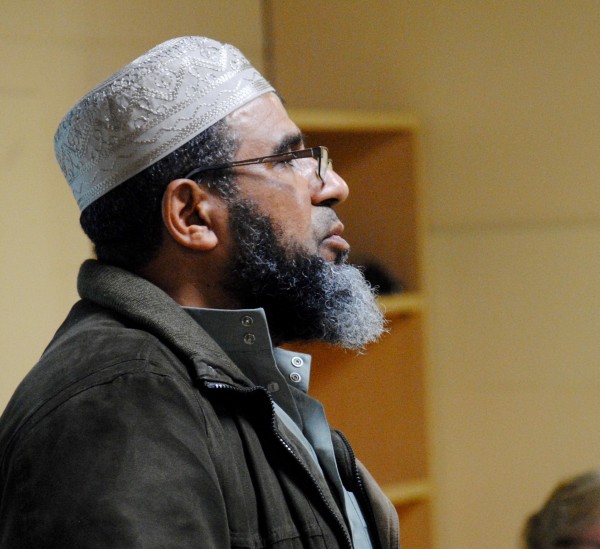
 Taft Mazotti, president of the Providence police union, and Jim Vincent, executive director of the Providence chapter of the NAACP, have very different opinions on the actions of a 17-year-old black employee of an Atwells Avenue Dunkin Donuts who wrote “#Blacklivesmatter” on a cop’s coffee cup.
Taft Mazotti, president of the Providence police union, and Jim Vincent, executive director of the Providence chapter of the NAACP, have very different opinions on the actions of a 17-year-old black employee of an Atwells Avenue Dunkin Donuts who wrote “#Blacklivesmatter” on a cop’s coffee cup.
The police union issued a press release chiding the teenage girl and the Black Lives Matter movement, while Vincent defended the young woman and the catch phrase that has unified people who feel that black people continue to be marginalized in America.
“The negativity by the #Blacklivesmatter organization towards Police across this nation is creating a hostile environment that is not resolving any problems or issues, but making it worse for our communities,” according to the press release. “They are doing this by increasing tensions amongst police and the people they serve.”
But Vincent thought it was the police who are increasing community tensions with its handling of the incident.
“I just think it makes the union look bad,” he told RI Future. “It gives people the impression that black lives don’t matter to them.”
Manzotti told RI Future this morning that the issue raised concern for the union because they believe that someone who would write black lives matter on a coffee cup may also try to poison a police officers’ coffee. “There’s been a concern that police officers have to be weary about where we can get something to eat or drink,” Manzotti said.
Vincent scoffed at the assumption that asserting that black lives matter indicates a direct threat to a police officer, noting that the movement is not even against police officers. “You cannot imply that because someone says black lives matter that they are against the police,” he said. “I think she probably just wanted to communicate that black lives matter and the officer took it the wrong way.”
I asked both Manzotti and Vincent if the officer missed an opportunity to dialogue with the woman about what the Black Lives Matter movement means to her.
“I think they missed an awesome opportunity to do some real community policing,” Vincent said. “Instead of bringing the community together they further fractured it. They may not have meant to do this but that’s what happened.”
Manzotti said the officer did not notice the message on his coffee cup until he arrived at work. “We’re a very busy department,” he said. “For an officer to take time to sit down with someone…”
Manzotti stopped mid sentence to tack away from officer time management to put the onus on the employee. “Let’s turn this around,” he said. “Could the employee have reached out and started a conversation?” When reminded he was tasking an urban teenager of color, rather than a law enforcement officer, with taking the lead in starting this conversation, he said, “Every single person knows right from wrong.”
Manzotti said he thought the young woman should be fired, but was careful to explain that the union did not ask the owner to fire her when they spoke earlier this week.
“We asked that he do whatever he feels is necessary to rectify the situation,” Manzotti told RI Future. “I can’t tell him what to do but I know if I had an employee working at my small business who did that, that person would not be working for me.”
Vincent acknowledged the teenager “maybe used poor judgment” but agreed with a reporter who said the employer would likely lose a wrongful termination lawsuit, as well as risk national backlash. “If there was no clear policy in place,” Vincent said, “…it’s hard to fire someone for something like this.”
Perhaps their biggest difference concerned the phrase black lives matter.
“I’d like to hear the union say black lives matter,” Vincent said. “Why can’t they say that? What is it that’s so difficult for them about acknowledging that black lives matter? It suggests to the community that black lives don’t matter to them.”
Manzotti was careful to avoid acknowledging that black lives matter and, like in the initial press release that kicked off this tempest in a teapot, explained, “because, to us, all lives matter.” He said he has not seen evidence in his life or career that black lives matter less than white lives.
Vincent said supplanting ‘all lives matter’ for ‘black lives matter’ is “almost like a code word for saying you don’t believe black lives matter.” He added, “Either intentionally or unintentionally, it marginalizes and minimizes the value of black lives.”
]]> “Before the Voting Rights Act of 1965,” said Jim Vincent, president of the NAACP Providence, “the majority of Black Americans were unable to vote. That’s what was happening in the Jim Crow south… Civil Rights activists fought, bled and died for these rights, and they are being rolled back every day.”
“Before the Voting Rights Act of 1965,” said Jim Vincent, president of the NAACP Providence, “the majority of Black Americans were unable to vote. That’s what was happening in the Jim Crow south… Civil Rights activists fought, bled and died for these rights, and they are being rolled back every day.”
Vincent was speaking at an ACLU panel discussion held at the Providence Public Library in August entitled, “The Voting Rights Act at 50: The Promise and The Struggle.” Hilary Davis of the ACLU directed the event, and in addition to Vincent, Kate Bowden of the RI Disability Law Center and Lee Ann Byrne of the RI Coalition for the Homeless attended.
The history of voter disenfranchisement was briefly discussed, as was the Voter ID laws that the RI General Assembly passed a few years ago. Many politicians feel that having to show a picture ID at the polls is not an undue burden, but Hilary Davis pointed out that years ago, many thought poll taxes, now seen as exclusionary, were not a big deal. Poll taxes, Jim Vincent added, “were designed to disenfranchise a whole group of people so that they couldn’t participate in our democracy.”
After the Voting Rights Act was passed 50 years ago, the percentage of registered black voters rose from 25 to 62 percent. More than that, the Voting Rights Act “provided the right to assistance in the voting booth. This allowed the illiterate, or the disabled, to vote,” said Kate Bowden.
For 47 years or so the Voting Rights Act was doing great. “Then states began to role back voting rights,” said Davis, adding that the Supreme Court virtually eliminated the VR Act when they struck down key provisions. “Over night… states started to enact laws to limit access… It was within a number of hours of Supreme Court decision that laws were introduced to limit voting rights.
And these laws are racially biased. Before Obama was elected President, seven states had laws restricting voter rights,” said Vincent. The number is around 25 now, and Rhode Island is not exempt.
“Rhode Island rushed to pass a [Voter ID] law,” said Davis, “Unlike most laws this is based on a couple of anecdotal incidents… Stats show their is virtually no evidence of voter fraud. Mail ballots became easier to obtain, the only place where fraud was found…No one thought that a Democratic [Party majority] state would manage to do that.”
Lee Ann Byrne said that for the homeless population though, “obtaining an ID is important to access many services… it comes at a major expense” and “despite the availability of the free IDs, it doesn’t make sense to get one that is good only for voting.”
Furthermore, said Byrne, “Poll worker training is a bit spotty” on the issue of voting without a permanent address. “We have a highly mobile population, our constituents almost never have an ID that matches their address.” And denying someone the right to vote or forcing them to cast a provisional ballot under these conditions, is not the law.
People can become embarrassed or caused distress at the polls if they can’t be certain about their right to vote. “There is a concern about being challenged or turned down when they make the effort,” said Byrne. To date only about 900 voter IDs have been issued by the Secretary of State’s office. Before the introduction of voter ID in Rhode Island, there were “zero prosecutions for in person voter impersonation’” but since the passage of the law, said Davis, otherwise qualified voters have been turned away.
Being forced to get a photo ID in order to vote, said Vincent, “is a form of poll tax.”
Another issue of voting concern to the ACLU is “prison based gerrymandering.” Right now the 4000 inmates at the ACI are counted as living in Cranston, on Howard Ave. These people are unable to vote, meaning that the citizens in this district have more voting power than people in the rest of the state. Their vote counts as more because there are less people voting in their district.
The state Senate passed legislation to correct this problem, which would count those people at the ACI as living at their home address, but it has not moved in the House.
The panel discussed other issues, such as long lines and long waits at the polls in some districts, which may cause people to lose out on their chance to vote if time is scarce, broken voting machines, lack of childcare at polls, mail ballot fraud, the need for early voting and issues regarding the Board of Elections.
The ACLU recommends two things needed immediately for the needed reform of our elections. First, the ACLU needs people to volunteer as poll monitors. Poll monitors would note when voters are turned away, when equipment malfunctions or when other irregularities occur. Secondly, the ACLU would like to see the voter ID law repealed.
To accomplish the second goal the public needs to talk to our legislators. Too many people think showing an ID at the poll is no big deal, but for the homeless, the disabled or the poor, securing an ID can be a terrific burden. Thoroughly discouraged, eligible voters may decide to skip voting all together, and this can’t be good for our putative democracy.
]]>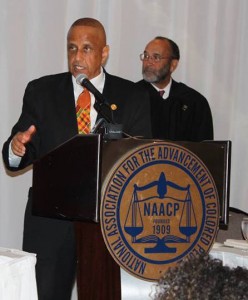 On July 21 I had the opportunity to sit down with Jim Vincent of the Providence NAACP and discussed a variety of topics. Mr. Vincent is a graduate of the 1973 Dartmouth College Urban Studies and Government program and hold an McP in City Planning from the University of Pennsylvania. Our conversation covered a variety of topics, including the prison and judicial reform Gov. Raimondo recently enacted, police recruitment policies, and the national election.
On July 21 I had the opportunity to sit down with Jim Vincent of the Providence NAACP and discussed a variety of topics. Mr. Vincent is a graduate of the 1973 Dartmouth College Urban Studies and Government program and hold an McP in City Planning from the University of Pennsylvania. Our conversation covered a variety of topics, including the prison and judicial reform Gov. Raimondo recently enacted, police recruitment policies, and the national election.
The NAACP is one of the oldest still-extant civil rights groups in America. Founded on February 12, 1909, it has been a major advocate for the rights of black and brown people since its inception, working to abolish Jim Crow and promote desegregation. It has been especially active in support for LGBTQQI rights and AIDS activism. This was especially prominent when Julian Bond, former Chairman, boycotted the 2006 funeral of Coretta Scott King, wife of Dr. Martin Luther King, Jr. because the family had chosen a church that opposed gay rights.
]]>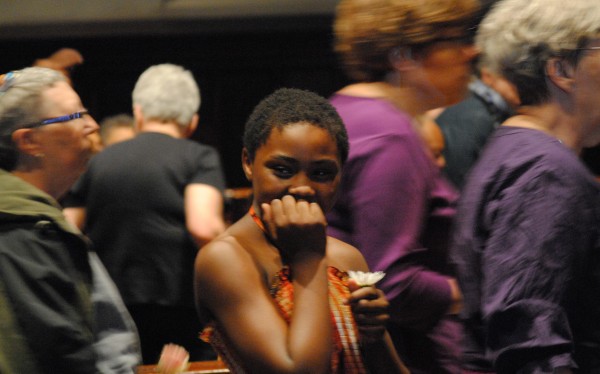 More than 400 people gathered inside the Grace Episcopal Church in Providence on Sunday afternoon for an interfaith memorial and prayer vigil for the victims of the racist murders that took place in Charleston more than a week ago. Though these events happened far from Rhode Island, our state is far from innocent. Ours is the state with the lowest percentage of Black home ownership. Our General Assembly ended the the legislative season unable to pass any laws banning guns from schools or keeping guns out of the hands of domestic abusers.
More than 400 people gathered inside the Grace Episcopal Church in Providence on Sunday afternoon for an interfaith memorial and prayer vigil for the victims of the racist murders that took place in Charleston more than a week ago. Though these events happened far from Rhode Island, our state is far from innocent. Ours is the state with the lowest percentage of Black home ownership. Our General Assembly ended the the legislative season unable to pass any laws banning guns from schools or keeping guns out of the hands of domestic abusers.
Jim Vincent, President of the NAACP-Providence Branch, connected the racism of the alleged shooter with the rash of church burnings throughout the south and with the racist leaflets recently dropped in East Greenwich.
Flowers were distributed to attendees, and candles were lit for the victims. It was an often emotional service, and the videos below document the entire event. The event ended with all those in attendance singing “We Shall Overcome.”
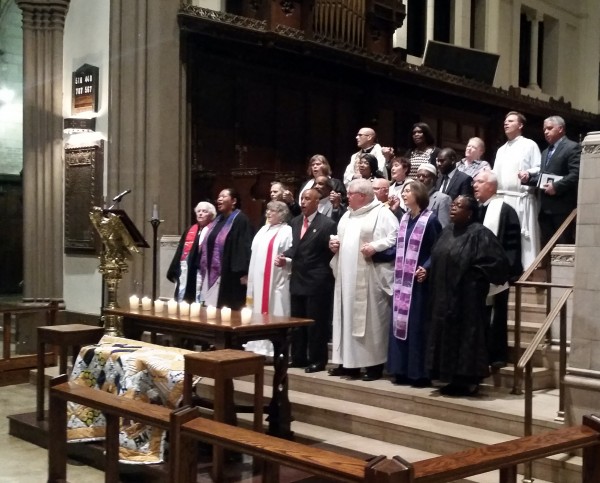
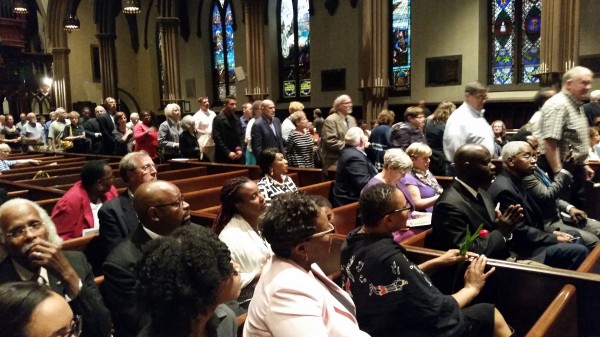
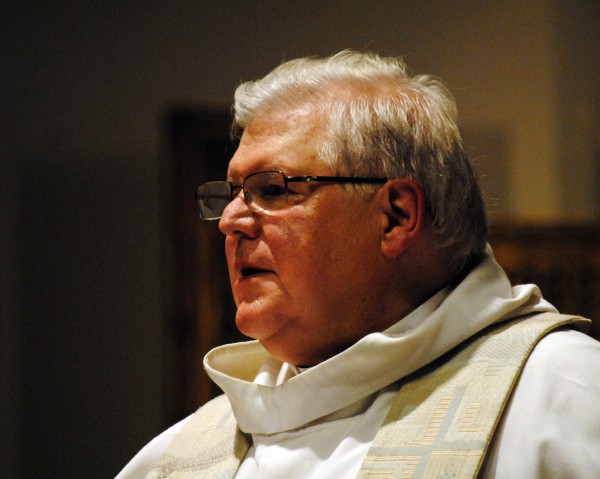
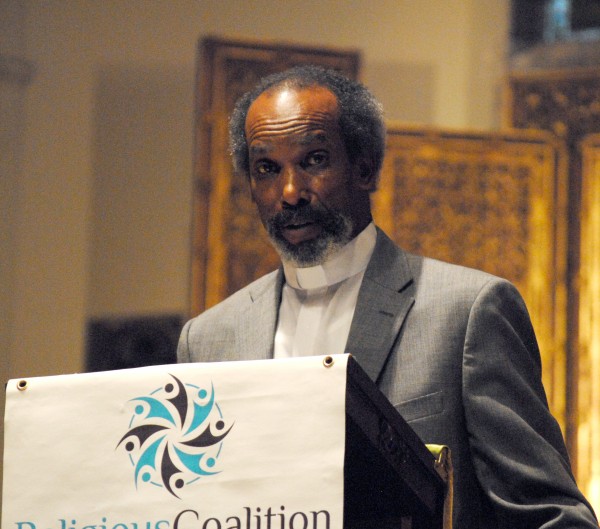
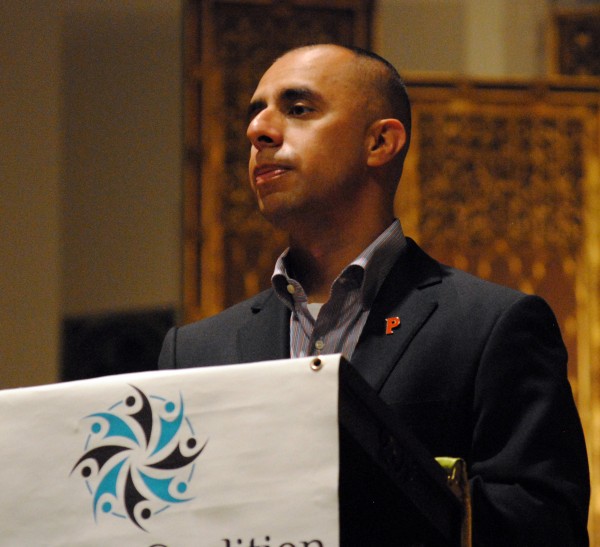
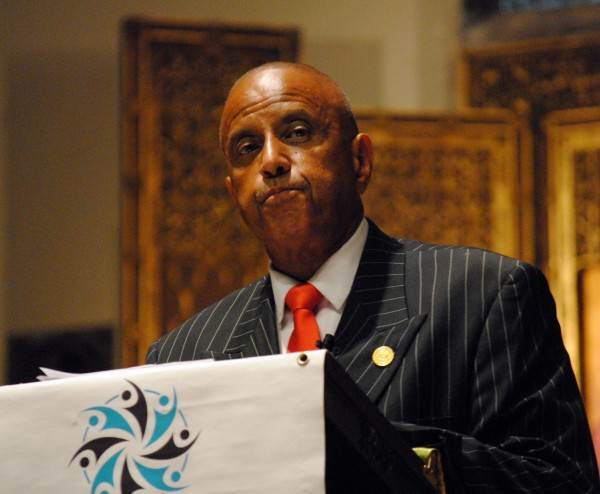
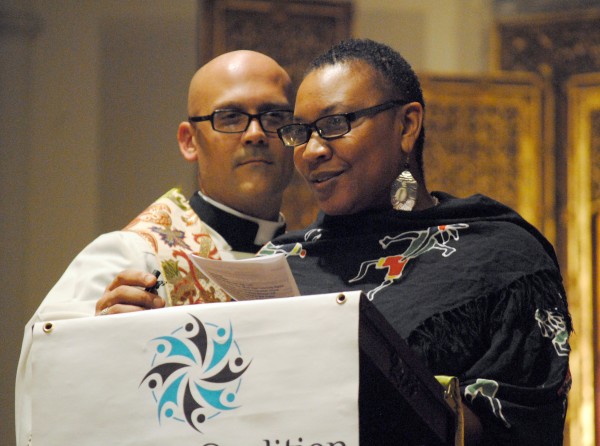
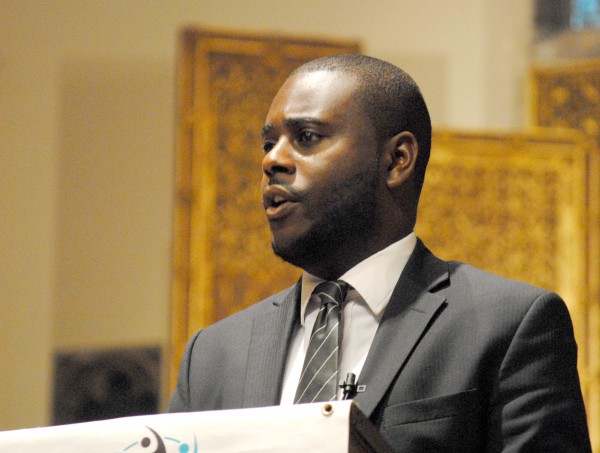
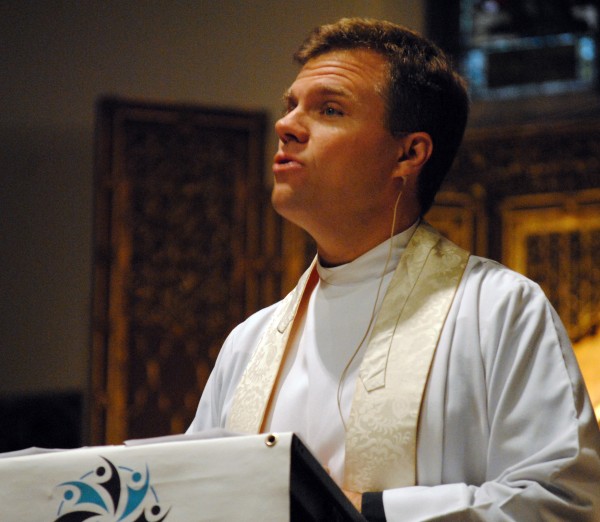
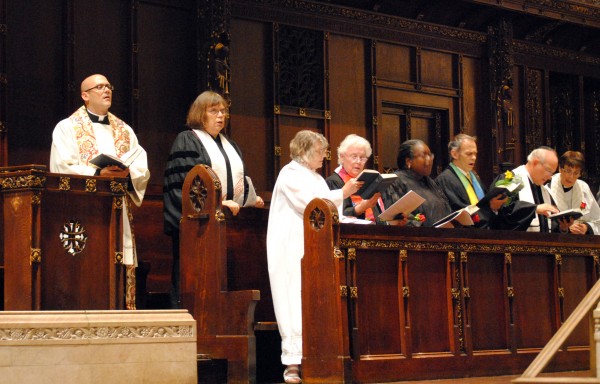
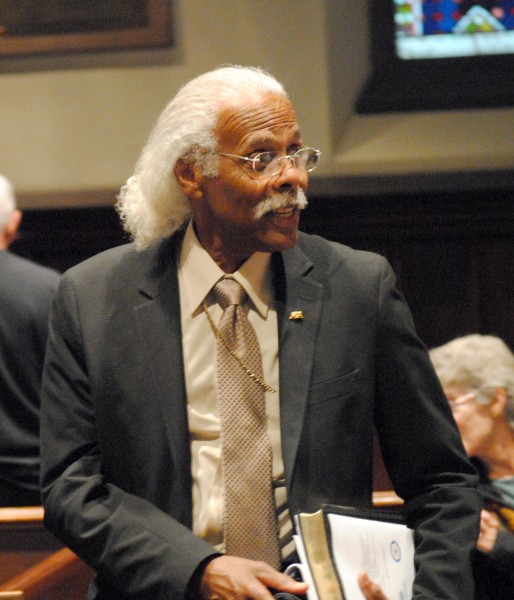
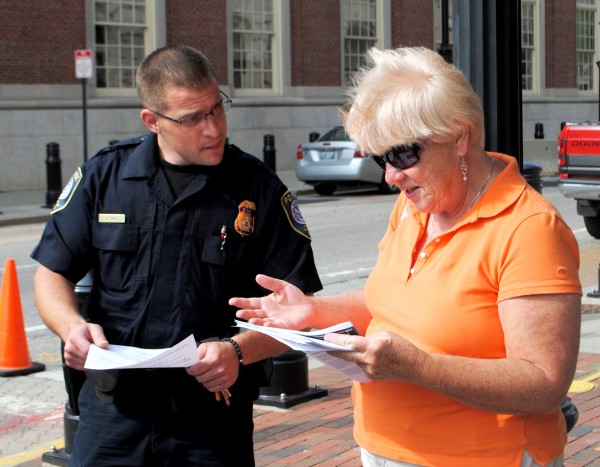 The House Judiciary Committee heard testimony on the Comprehensive Community Police Relations Act, (CCPRA) H5819, a bill that seeks to combat racial profiling by requiring “all police departments to submit to the Office of Highway Safety an annual report indicating what action has been taken to address any racial disparities in traffic stops and/or searches.”
The House Judiciary Committee heard testimony on the Comprehensive Community Police Relations Act, (CCPRA) H5819, a bill that seeks to combat racial profiling by requiring “all police departments to submit to the Office of Highway Safety an annual report indicating what action has been taken to address any racial disparities in traffic stops and/or searches.”
The act would also prohibit police officers from asking juveniles and adult pedestrians if they will consent to be searched. Right now, a police officer who lacks probable cause to conduct a search is allowed to ask permission to search pockets and backpacks. Preventing police officers from asking for permission to conduct searches of citizens who present no probable cause protects juveniles from being intimidated into giving assent.
The bill under consideration is the culmination of at least 12 years of effort on behalf of community organizations and members of law enforcement. Providence Public Safety Commissioner Steven Paré helped craft the bill in a way that would satisfy a wide range of concerns. The meetings were held in an open and forthright manner and anyone was welcome to join in.
Why then does Attorney General Peter Kilmartin‘s office oppose the bill?
Special Assistant Attorney General Joee Lindbeck testified that the AG’s office opposes the bill because it would require police officers to ask permission to search juveniles. She also said that the Attorney General’s office was not privy to the meetings between law enforcement and community group’s where the bill was put together.
Under questioning from Representative Edie Ajello, Lindbeck admitted that under current law, a police officer without probable cause cannot ask for consent to search your automobile, but is allowed to ask for consent to search an adult pedestrian or juvenile. Doesn’t this, asked Ajello, protect the privacy of automobile drivers more than the privacy of adult pedestrians and juveniles?
“That is a position you could take, I believe,” replied Lindbeck.
Michael Évora, director of the Rhode Island Commission for Human Rights, took issue with the Attorney General’s position on the bill. The bill does not prohibit a police officer from searching an adult pedestrian or juvenile if there is probable cause. It only prevents a police officer from asking for permission if there is not probable cause. This does not amount to a public safety issue, as Lindbeck asserted, said Évora.
Évora also took issue with the idea that the Attorney General’s office was somehow unaware of or not able to attend the meetings between community organizations and law enforcement officials where the bill was painstakingly crafted. “The meetings were always open,” said Évora. Further, Évora maintains that Commissioner Paré and Attorney General Kilmartin met weekly on a variety of issues, and that Kilmartin was surely informed about the content of the bill. “It is disingenuous at best,” said Évora, “to say the Attorney General was not aware.”
Speaker after speaker addressed the necessity and immediacy of the CCPRA.
Jim Vincent of the RI NAACP spoke of the importance of this legislation in building some sense of trust between communities of color and the police. “There is no need for a Rhode Island name,” said Vincent, “to be added to the long list of young men and women who have needlessly lost their lives due to police violence.”
“If we have hopefully learned anything from the outbreaks in Ferguson, Cleveland, Staten Island and of course the recent unrest in Baltimore,” said Jordan Seaberry, chairman of the Univocal Legislative Minority Advisory Commission, “it is that we cannot afford to avoid the question of race in our society.”
Seaberry went on to say that the legislators in the General Assembly “are tasked with creating the conditions for Rhode Islanders to prosper.”
“As long as racial profiling exists, we in fact are dooming families, neighborhoods [and] communities to [the] fringes. We cannot have prosperity without equity.”
Ray Watson, director of the Mt. Hope Community Center was offended that the Attorney General’s office would suggest that the process of developing the bill was not open and inclusive. He was doubly offended that the rights of juveniles were held to a lower standard than the rights of automobile owners.
Prompted by Rep. Edie Ajello, Watson spoke about being stopped and searched by the police, and the effect police harrassment has on young people of color. “It gets to a point that when you’re a youth and you’re out in the community, I mean, there’s only so much your parents can do to protect you. So you get to a point where you’re like, ‘you know what, as long as I didn’t get arrested or I didn’t hurt it’s fine’ but it definitely breeds resentment towards law enforcement.”
In compelling testimony, Ann DeCosta spoke of her concern for her 23 year old son, a recent graduate of the University of Rhode Island. The problems of raising a child are multiplied when raising a young man of color in this society, says DeCosta, “From a young age I taught my child, if you get separated from me, if you are hurt, if you need assistance, look for that badge… that’s the person you need to trust.”
But, when her son got older, and went to URI, her son told her that, “he gets stopped, 3 or 4 times a month in North Kingstown and Narragansett… I find this very upsetting… Everyone in the car is asked for ID, sometimes they’re pulled out of the car and searched for reasons such as having an air freshener hanging from the mirror…”
When Eugene Montero sent his son to the store for some milk in Coventry, his son was stopped by a police officer and told to turn out his pockets because he “fit the description” of someone selling drugs. When Montero called the police station to complain about his son’s treatment, the police had no record of the incident. “What I’m sad to say,” said Montero, “is that my kids have had several incidents since moving back to Rhode Island. My two boys who are now grown, have moved. They live in Florida.”
When Mike Araujo was 14 years old, he was beaten “very badly” by a police officer. “I had my skull split. I had my eye orbit broken. I had my jaw broken. My fingers broken. He broke my ankle. I remember that he stepped on my knees to prevent me from standing up.”
When Araujo became an adult, he tried to look into the beating he had endured. “When I looked into the record, I found it was really hard to find my own name. I finally found it, it was ‘African American male, approximately 18,’ (I was 14), ‘resisted arrest on Westminster St.'”
As these stories show, presently there is little to know accountability. Without the police keeping accurate records of all stops and searches, there is no way to introduce policies to curb abuses and racism. The Comprehensive Community Police Relations Act would be a great start in the right direction.
]]>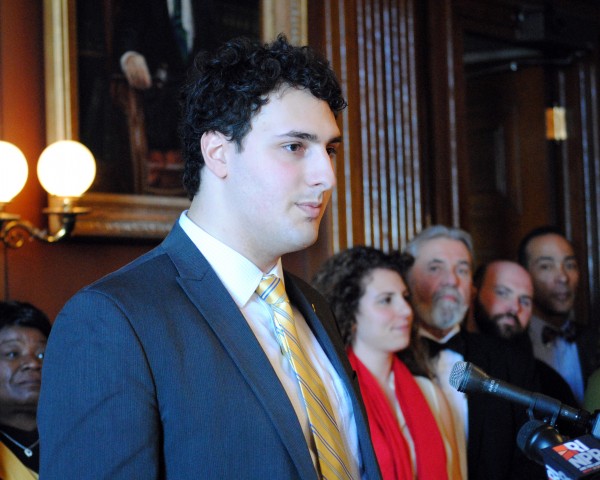
A large coalition to raise the tipped minimum wage was launched at the State House with a press conference and public testimony on House Bill 5364. Representative Aaron Regunberg introduced the bill that would gradually increase the the minimum wage from $2.89 to match the regular minimum wage by 2020. Senator Gayle Goldin introduced matching legislation on the Senate side. There has been no increase in the tipped minimum wage in nearly 20 years.
ROC United RI (Restaurant Opportunities Center) launched “One Fair Wage Rhode Island,” an impressive coalition of community, labor, faith business and women’s organizations that includes the Women’s Fund of Rhode Island, RI-NOW, NAACP-Providence Branch, Farm Fresh Rhode Island, the Economic Progress Institute, the Bell Street Chapel, Rhode Island AFL-CIO, the Coalition of Labor Union Women, Rhode Island Jobs with Justice, Fuerza Laboral, NEARI, United Service and Allied Workers of Rhode Island, Planned Parenthood of Southern New England and Unite Here Local 217.
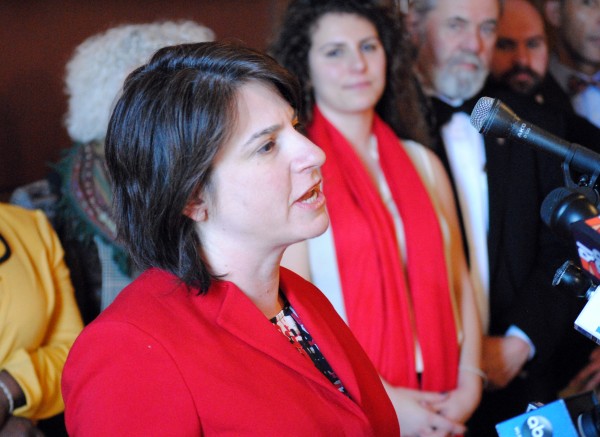
Many restaurant patrons are unaware that their tip is not simply a “thank you” for great service, said Senator Goldin, “It’s paying your server’s base salary, and nobody’s base salary should entirely depend on a customer’s mood.”
More than just being an issue of fairness, this is an issue of impacting “women’s economic security,” says Women’s Fund Executive Director Jenn Steinfeld. “Nearly three in four Rhode Island tipped workers are women, one-third are mothers, and more than half of these are single mothers.” Steinfeld says that eliminating the tipped minimum wage will “help address the gender pay gap.”
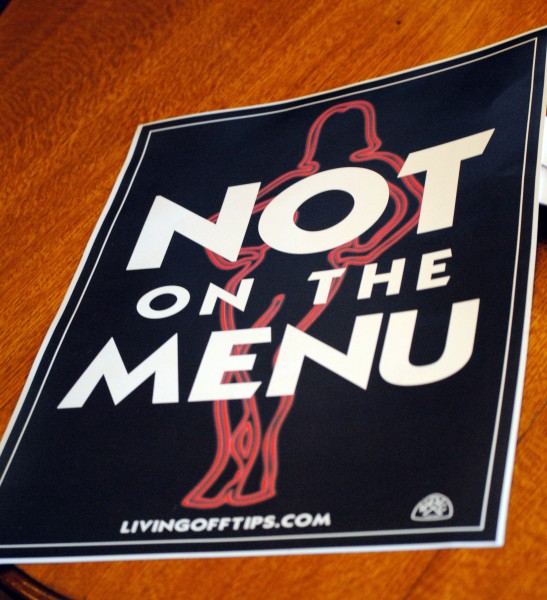 Being dependent on tips for their salary makes servers more vulnerable to sexual harassment, since telling a customer that their advances or flirting is unwelcome puts the server at risk of losing a tip. A recent report from the national ROC United found that, “Women living off tips in states with a $2.13 an hour tipped minimum wage are twice as likely to experience sexually harassment than women in states that pay the full minimum wage to all workers. In fact, all workers in $2.13 states, including men, reported higher rates of sexual harassment, indicating that the sub-minimum wage perpetuates a culture of sexual harassment.” It’s in response to this atmosphere of sexual harassment that ROC United has launched its “Not on the Menu” campaign.
Being dependent on tips for their salary makes servers more vulnerable to sexual harassment, since telling a customer that their advances or flirting is unwelcome puts the server at risk of losing a tip. A recent report from the national ROC United found that, “Women living off tips in states with a $2.13 an hour tipped minimum wage are twice as likely to experience sexually harassment than women in states that pay the full minimum wage to all workers. In fact, all workers in $2.13 states, including men, reported higher rates of sexual harassment, indicating that the sub-minimum wage perpetuates a culture of sexual harassment.” It’s in response to this atmosphere of sexual harassment that ROC United has launched its “Not on the Menu” campaign.
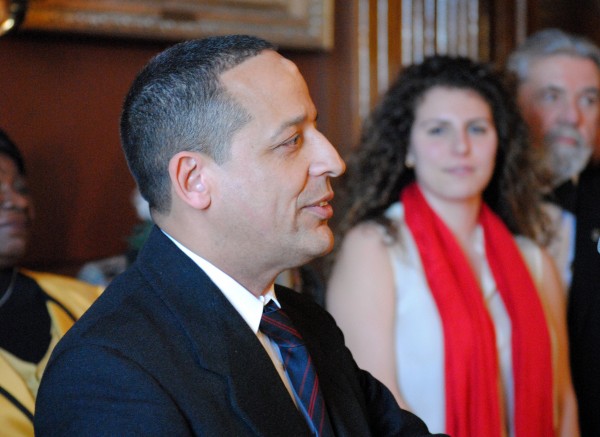
There is also good economic sense in raising the tipped minimum wage, maintains Mike Araujo, of ROC United RI. “”Raising the subminimum wage will have an important stimulative effect for Rhode Island. When tipped workers earn more, that money goes right back into the local economy.” ROC United estimates raising the wage will pump $64 million into the state’s economy. Further, tipped workers in Rhode Island currently receive $638,325 in food stamps every month, which means that taxpayers are effectively subsidizing the restaurant industry through social welfare programs.
After the press conference there was a heaing on Regunberg’s bill in the House Labor Committee. Though over 150 people signed up to testify, on both sides of the issue, in the end only 25 people could endure the four hour hearing waiting for their turn to speak. Those speaking against raising the tipped minimum wage were mostly members of the Rhode Island Hospitality Association (RIHA), a business lobbying group that routinely opposes any legislation that might raise the minimum wage or improve the ability of workers to collect money lost to wage theft. Many of the RIHA members wore small golden pineapple pins.
“The states that have eliminated completely their subminimum wage,” said Representative Regunberg describing the economic impact of his bill, “have as high or higher industry and job growth rates as subminimum wage states.”
Bill Kitsilis, of Angelo’s Palace Pizza sees no reason to raise the tipped minimum wage, and said, “My tipped employees… are some of the highest paid employees in my business.” He thinks $2.89 is fine, since that’s what he predicated his business model on. Comparisons with other states are not valid, Kitsilis maintains, because other states have much, much stronger economies.
Representative Antonio Giarrusso asked about employee turnover. Kitsilis feels that turnover only happens when people aren’t making money, and he also says that there are a lot of people hiring right now, making it difficult to find workers. An odd statement, considering Rhode Island’s unemployment rate.
The issue of “side work” came up, that is, the work servers do for a restaurant, at $2.89 an hour, that doesn’t earn the server tips. Side work is an old way of getting work done in a restaurant on the cheap, and is completely legal. Raising the subminimum would eliminate this disparity. Kitsilis said that such work “tends to be… a small percentage of what they do, most of the time…”
Representative Teresa Tanzi has worked in the restaurant industry for 14 years. “In those 14 years I have worked at dozens of restaurants, somewhere around 45 restaurants, I would say. And in all those restaurants, one has paid me according to the law.” For fear of retaliation, she could never confront management about this. “I’m well aware that they are breaking the law, but there is nothing I can do. I am relying on my manager and the owner of that restaurant for my employment.”
The Department of Labor surveyed 9000 restaurants over two years and found that 84 percent of them violate the law.
When Chairperson Joseph Shekarchi pushed back against Tanzi’s experience, saying that he doesn’t see the connection between low wages and harassment and abuse of servers, drawing on his experience as a bartender, Tanzi stuck to her guns and pointed out that the experience of women working as servers and men working as bartenders are very different. “It does happen and it’s a daily occurrence. If someone touches you, or if you’re waiting on a table and it’s a party of ten and that’s all the money you’re going to make tonight, and they want to be fresh with you in some way shape or form… I refer to it as a ‘golf clap’ in my vernacular. Whenever someone says something that’s ‘funny,’ you’re waiting on someone and they something that isn’t funny, you have to laugh. If someone touches you inappropriately, what are you going to say? There’s very little recourse as a server that you have.”
Rep Giarrusso’s solution for “any woman or anybody getting sexually harassed” is that “they should hit somebody with a nine iron.” Maybe he’ll introduce legislation to that effect.
“The truth is, 60 percent of restaurant workers in Rhode Island are over the age of 24 and 32 percent of all of Rhode Island’s restaurant workers are parents.”
“I feel that the current wage devalues me as an employee,” says Daniel Burke. Burke explained how the days and hours he is making good money from tips are averaged with the days and hours he’s performing other tasks at the restaurant. As long as he averages minimum wage with the money provided by customers, the restaurant can get away with paying him $2.89 an hour. Of course, Representative Giarusso thinks that Burke should take this issue up with his employer because, “I would, that’s for sure.”
As a 31 year old mother explains that her bartender job requires her to perform duties that are not directly related to serving customers. Therefore no tips can be expected and the restaurant gets away with paying employees $2.89 an hour for work that any other business in the state would have to pay at least minimum wage to accomplish. Again, Representative Giarrusso misses the point, thinking that the issue of side work isn’t related to this. As long as there is a two-tiered wage system, restaurant managers and owners will have an incentive to make workers do untipped work at the lower wage, rather than pay the server properly.
ROC United RI’s Mike Araujo finally explains that “those extra tasks,” that is side work, are “built into the job.” Side work, prep and cleaning averages out to about 3 or 4 hours a day, which is “effectively unpaid labor.” This profitable industry is built on the backs of primarily underpaid women.
Araujo may have summed up the night best when he said, “This issue speaks to how we believe society should be shaped. Do we believe that our citizens deserve equal treatment and deserve full equality, or do we believe that there is a second tier that women, increasingly, belong to?”
“Moving into a restaurant that paid over the minimum wage had such a tangible benefit…”
“When we talk about this issue we can’t escape the fact that this is a women’s issue… forcing a worker to rely on tips for any portion of their base wage significantly increases their chances of experiencing sexual harassment.”
Once again, Representative Giarrausso claims that “I don’t really understand the connection to sexual harassment… If someone’s a jackass, for lack of a better word… I mean, I don’t promote sexual harassment. I think those people should be tied up and jailed and never come out.” Giarrusso claims he “can’t draw the parallel” between low pay and sexual harassment.
But Giarrusso tips his hand as he grins and asks, “Is there an acceptable level of sexual harassment depending on how much you’re getting paid?” This is simply a variation of the line, variously ascribed to George Bernard Shaw or Winston Churchill, “We know what you are, we’re just haggling over the price.”
In response to testimony quoting FDR, Rep. Giarrusso maintains that “there is data that shows that every time minimum wage goes up, so does unemployment.” The US Department of Labor dispels that myth at the top of its page on the minimum wage. Giarrusso also brings up the specter of automation, as is done now whenever minimum wage increases are discussed. I deal with the automation argument here.
Joe Fortune, speaking below, wrote about his experience speaking before the committee on his own blog here.
Notice the pineapple pin. RIHA is in the house. This man is a CPA who specializes in hospitality. I am willing to bet he makes more than $2.89 an hour plus tips.
John Elkhay owns Ten Prime Steak & Sushi, Rick’s Roadhouse, XO Café, Luxe Burger Bar, and Harry’s Bar & Burger, as well as Veritas Catering. “Unlike the people who testified before me,” says Elkhay, “I actually live and work in Rhode Island.” I guess he wasn’t listening to the experiences of the four speakers who do live and work in Rhode Island. After telling the committee about how many employees he has and how much money they all make, he throws them under the bus, saying, “They don’t claim all their tips, by the way. That’s a sneaky little secret.”
“Don’t say that in this building,” says Representative Giarrusso, trying to make light of the comment.
Elkhay doesn’t blink. “Yeah, well, it’s the truth.”
“Who is here, in the industry, saying there is a problem?” asks Chris Tarro, owner of Siena Restaurant Group, answering “I don’t think there is a problem.”
“Don’t take my word for it,” he continues. Rather, he recommends going out to dinner and asking a server. But, “don’t ask if they want a raise, everyone would like one.”
Tarro thinks that the kind of retaliation employees face for stepping up to complain about their working conditions is somehow equivalent to the reaction of potential customers when they hear about the ways restaurants pay their employees and the ways in which many restaurants exploit their employees. “When I testified last time here,” says Tarro, “I got emails, I was on progressive blogs… there’s a penalty to us coming here.”
“I would like to give a nice big golf clap to Representative Tanzi and to anyone else who is trying to distract you from the issue at hand…” is as much as this sarcastic restaurant owner could say before being stopped by Chairperson Shekarchi, who advised not going after those who previously testified.
“I don’t want character assassination,” said Shekarchi, “It doesn’t help your cause.”
“I would suggest to you that twenty years… twenty years without a raise… I don’t think there’s anybody in this room that’s going to work for anybody for twenty years without a raise.”
Kristin Dart, speaking for Planned Parenthood, said that when women are paid more, they are better able to pay for essential medical care.”If I have to choose between food on my table and my annual health exam, I’m going to put food on the table.”
Speaking of her own experience as a server, she said that she was regularly told by her bosses that sexual harassment was “part of the job. If you want to make tips, then you have to be ‘nice’ to customers.”
Amy Barclay owns Simpatico in Jamestown. She’s worked her way up from being a server, pregnant with twins making $4500 a week to owning her own place. She says, “This isn’t a gender issue. This isn’t a Planned Parenthood issue, this is a performance issue.” Barclay says, “I was great staff. I still am.”
Barclay has 15 core employees and 60 in season. “They beg for their jobs back,” she says, “and they should.”
Having worked in California, where there is no tipped minimum wage, and now working in Providence, Avi maintains that in California the restaurant industry is booming and that people in the restaurants out there have a greater feeling of teamwork. “It should be the employers responsibility to pay their employees, and not to pass that on to the customers.”
Ray Desmarais, of 99 Restaurants, sounded like he was blaming victims for for their harassment when he said, “For anyone to be harassed in the restaurant business, shame on them for allowing it. Leave and come work for me. Cause I’m a good guy and I’ll treat you well.”
Senator Joshua Miller says, “…there hasn’t been a minimum wage bill I didn’t love, until today, until this bill.” Miller feels this bill takes “important revenue away from some of my most valued staff.” He owns three restaurants with over 80 servers. Senator Miller, like Representative Giarrusso, sees no relationship between low wages and sexual harassment.
Justin Kelley said that “it’s time to raise the wage” in Rhode Island. Business models change, says Kelley, citing out the end of slavery, child labor and the eight hour day as examples. Compared to those changes, raising the subminimum wage should be easy.
“I think it’s a human rights issue,” says this restaurant worker from Olneyville, “I don’t care if your male or female, that minimum wage needs to come up.”
Bob Bacon is the owner of Gregg’s Restaurants and the president of the Rhode Island Hospitality Association. He frequently visits the State House to testify against bills that might increase a worker’s wage or strengthen a worker’s ability to not have their wages stolen. Bacon feels that the Department of Labor is doing a terrific job enforcing labor laws, and no new laws are needed. Servers make a “self-reported” average of $12.12 an hour, says Bacon.
Sam Bell, president of the Rhode Island Progressive Democrats, explained President Obama‘s support for increasing the minimum wage and for increasing the tipped minimum wage. “Raising the full minimum wage and the tipped minimum wage will help reduce poverty among women and families as well as make progress towards closing the gender pay gap.”
“Considering a tipped minimum wage increase… would cost ten percent of our current sales.” This begs the question: Is the entire profitability of the restaurant industry dependent on paying servers subminimum wage? Do restaurant profits come solely from underpaying staff? How do restaurants remain profitable in California, where there is no tipped minimum wage?
She finishes the evening’s testimony with, “we’re seeing servers being replaced right now with technology all over the world.”
As I’ve said before: technology like that is coming no matter what we pay our employees. The questions we need to be asking in the face of new technologies are bigger than minimum wage increases, such questions go to the heart of our economic system, and whether it’s sustainable in the long term.
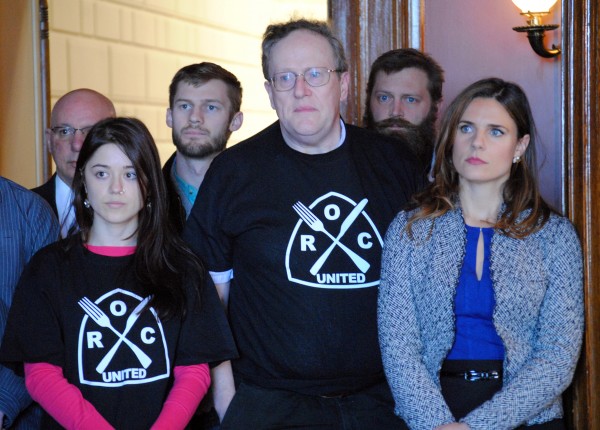
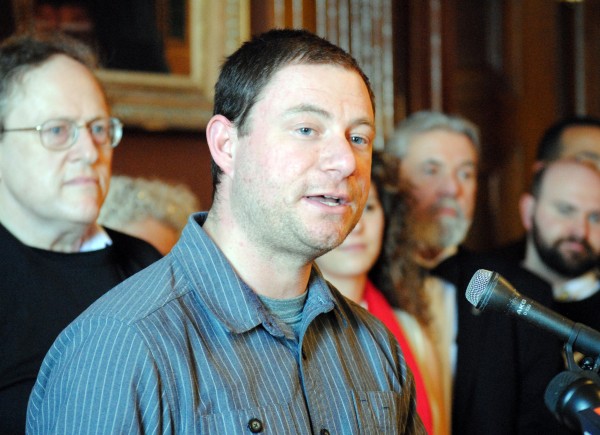


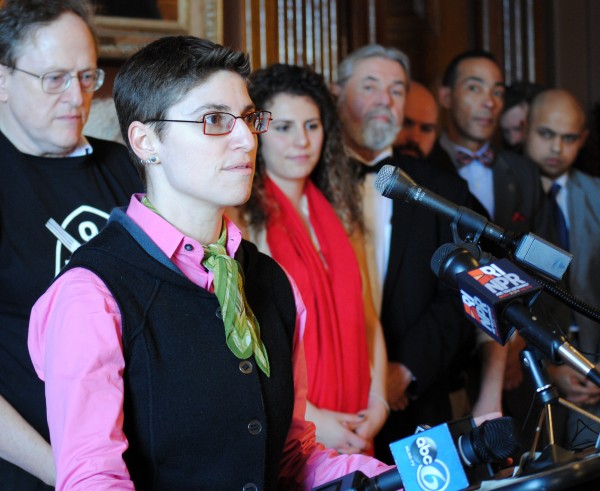


]]>
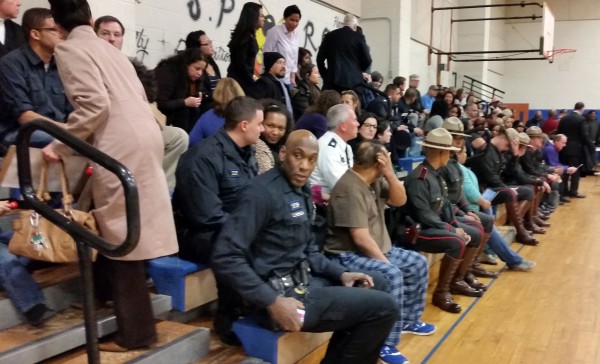 Saying a “deficiency in agency diversity” exists in police departments across Rhode Island, the NAACP Providence Branch has asked the National Association of Black Law Enforcement Officers to review the racial diversity and hiring practices of every police department in Rhode Island.
Saying a “deficiency in agency diversity” exists in police departments across Rhode Island, the NAACP Providence Branch has asked the National Association of Black Law Enforcement Officers to review the racial diversity and hiring practices of every police department in Rhode Island.
“It’s part of making sure police departments are reflective of the communities they serve,” said Jim Vincent, president of the NAACP Providence Chapter. “We’re going to learn the diversity make-up for every police department in Rhode Island, and where that diversity is in terms of hierarchy.”
The study will look at every municipal police department an the state police, said Vincent. It will be ready soon, said Charles P. Wilson of NABLEO.
“After a 3-month process of gathering and analyzing data, we anticipate releasing the formal study sometime next week.” he said in an email. “The training program, entitled ‘Identifying Barriers To Diversity in Law Enforcement-A Community Affair’ will be presented Friday, April 17, 2015 and will be sponsored by NABLEO, the Providence Branch NAACP, and the Roger Williams University School of Continuing Studies.”
A press release from the NAACP Providence Chapter said, “NABLEO will conduct both a survey of all law enforcement agencies to determine the number of minority officers employed, how recruiting information is published and disseminated, and the strength of outreach measures used to notify possible candidates, as well as a training program to be offered to both law enforcement and community members on enhanced methods for recruiting qualified candidates of color.”
In a subsequent interview, Vincent added, “We really don’t have a good feel for the number of African American and Latino and Asian police officers in Rhode Island.” Though, we already know Providence police doesn’t look like the Providence community.
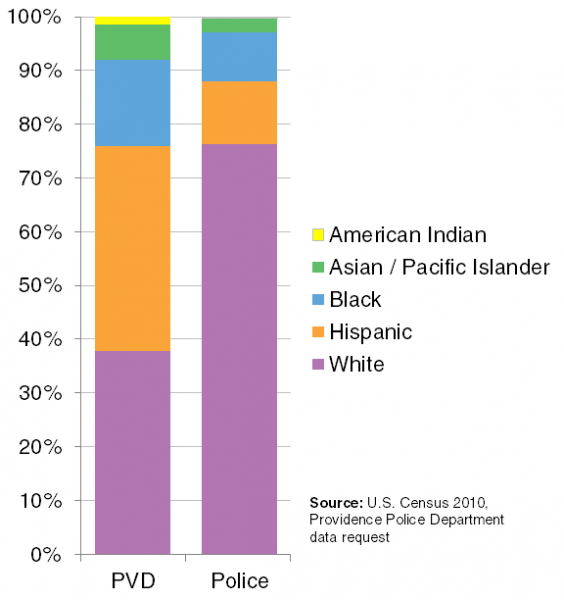
In December, Alex Krogh-Grabbe reported that Providence police is among the least racially representative police department in the nation. He wrote, “the 444-officer Providence Police Department is 76.3 percent White, 11.7 percent Hispanic, 9.0 percent Black, 2.7 percent Asian or Pacific Islander, and 0.2 percent American Indian. According to the 2010 U.S. Census, the city as a whole is 37.8 percent White, 38.3 percent Hispanic, 16.1 percent Black, 6.5 percent Asian or Pacific Islander, and 1.4 percent American Indian.”
In a statement, Providence Public Safety Commissioner Steven Paré told him at the time, “Recruiting a diverse workforce is always a priority. We hired two recruit classes for the PFD and one recruit class for the PPD. It was one of the most diverse classes we’ve had in our history. Our goal is to mirror the community we serve. The challenge is to reach out to the available workforce in the region and recruit the best candidates.”
]]> It’s 50 years since two game-changing acts of Congress, the Civil Rights Act of 1964 and the Voting Rights Act of 1965. Fifty years is not so long ago, especially when it’s still necessary to march in the streets to say that Black Lives Matter.
It’s 50 years since two game-changing acts of Congress, the Civil Rights Act of 1964 and the Voting Rights Act of 1965. Fifty years is not so long ago, especially when it’s still necessary to march in the streets to say that Black Lives Matter.
The movie, Selma, was years in the making and no one involved in this labor of love could anticipate its release in the wake of a series of shootings of Black men and women that expose a broken justice system and persistence of racism.
It was not easy to watch a recreation of what was a far from simpler time. The screening and discussion organized by The NAACP Providence Branch & the National Coalition of 100 Black Women was a welcome opportunity to watch it in good company.
First impression was that about 250 Rhode Islanders were up for coming to the Mall to watch a difficult film on a cold Saturday morning, including about 100 high school students. I worried we wouldn’t get a seat, but everyone did. It seems so wrong that when you buy a movie ticket now they show commercials on the big screen. We endured commercials and a preview of some comedy adventure full of explosions and shooting.
Selma has enough of that. After a quiet moment with Martin and Coretta King preparing for the Nobel Peace Prize ceremony the bombing of the 16th Street Baptist Church is mercilessly recreated. Denise McNair, Carole Robertson, Addie Mae Collins, Cynthia Wesley killed and many others injured and bereaved.
This is a kind of film violence that goes deeply against the grain of American culture. Unlike the guns and bombs in the previews and posters in the lobby, the guns in Selma shoot actors who play ordinary people, and the mourning of families, like the mother and grandfather of Jimmie Lee Jackson, is given full respect. When the actor playing James Reeb came on screen I felt pride and dread. Pride that a Unitarian minister was there on the front lines, and dread because I knew Rev. Reeb died in a vicious racist beating.
What was it all for? From the opening scene where Annie Lee Cooper is cheated and humiliated when she tries to register at the courthouse, to Martin Luther King and Lyndon Baines Johnson facing off in the Oval Office about whether Black America can wait any longer the right to vote is central. This is why the Civil Rights workers put their lives on the line on the Edmund Pettis Bridge.
After the film ended the audience sat through the credits and almost all stayed for the discussion. Some who spoke were veterans of the Civil Rights Movement. Amanda Milkovits covered it well in The Providence Journal. Like Rose Weaver said, “voting is everything.”
Selma shows just some of what it took to claim that right, and has a message when that right is again challenged.
Photo from ByTheirStrangeFruit via Google Images.
]]>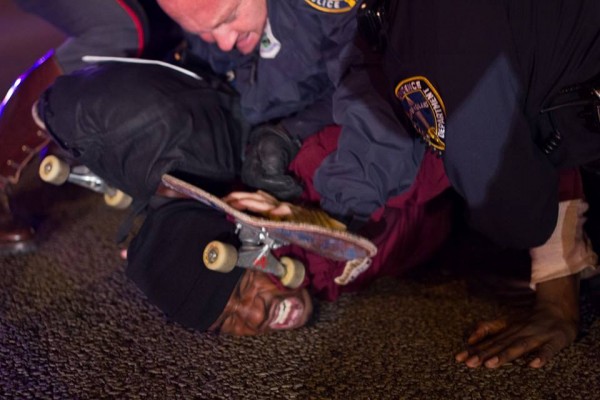
The Rhode Island State Police are hosting in South Providence on Monday night what a press release called a ““New Beginnings Community Outreach Forum: A Follow-Up to the Ferguson Decision.”
According to the press release, “The forum will address the recent issues surrounding the grand jury decisions in Ferguson, Missouri and New York City and the impact it has made on law enforcement and the communities they serve.”
The forum is Monday, December 15, 2014 8:00 p.m. to 9:30 p.m. at South Providence Recreation Center 674 Prairie Ave. in Providence.
The press release says the forum is “in partnership with Project Night Vision, the Center for Southeast Asians, the Hispanic Ministerial Association of Rhode Island, the NAACP, the Multi-Cultural Center for All, the Mount Hope Neighborhood Association, the Chad Brown Alumni Association, the African Alliance, the Institute for the Study and Practice of Non-Violence, and other community groups.”
Jim Vincent, president of the Providence chapter of the NAACP, said the forum will be beneficial for both residents and police officer.
“The people in South Providence, they don’t know the police,” Vincent said. “And for too many people, they don’t trust the police. They see them as occupiers. We want the police in our communities, we need them in our neighborhoods. But we don’t need to feel in fear of them, we don’t need to feel threatened. It’s counter-productive.”
Vincent said local law enforcement has, by and large, done a decent job handling the recent unrest in Providence. But he was critical of Providence Public Safety’s decision to publicly reprimand a Black firefighter for showing support for protesters and publicly exonerating a White police officer for using a skateboard to pin down a Black suspect. He said those two actions drew an unfortunate picture.
]]>
